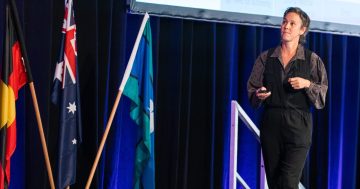Nassim Khadem* says a recent census has shown that it could take 100 years for corporate Australia to achieve CEO gender balance.
 If nothing is done to change the status quo, it will take about 100 years for corporate Australia to have at least 40 per cent of CEO positions on the ASX300 filled by women.
If nothing is done to change the status quo, it will take about 100 years for corporate Australia to have at least 40 per cent of CEO positions on the ASX300 filled by women.
The latest Chief Executive Women (CEW) Census is out, and the results show the nation’s biggest companies are actually going backwards in terms of female executive appointments.
It shows that more ASX300 companies have no women in their executive leadership teams compared to this time last year (16 per cent in 2022, compared to 15 per cent in 2021).
Of 28 CEO appointments at ASX300 companies in the past year, only four were women.
There are 18 women CEOs on the ASX300 – no improvement compared to last year.
Even the top 100 companies, which supposedly do better on gender balance, has just 10 female CEOs.
“We would have hoped for more progress by now,” CEW president Sam Mostyn said.
“We did start to get warning signs during COVID when we heard stories of decisions made about not appointing women into senior leadership roles on the basis that it was too risky.”
She said for those companies that are not progressing, “there’s either a failure of imagination and commitment” or “not realising the value to the company of committing to your gender balance leadership”.
More CEO’s named ‘John’ or ‘David’
Fortescue chief executive and CEW Member, Elizabeth Gaines, said little has changed since she was appointed to the top job at the miner.
“When I was appointed CEO of Fortescue in 2018, there were more male CEO’s of ASX listed companies named ‘John’ or ‘David’ than there were female CEO’s of ASX listed companies,” Ms Gaines said.
“Unfortunately, the results from the 2022 Chief Executive Women Census show little has changed since then, with no improvement in the number of female CEO’s in ASX300 companies from 2021.”
“We are still having the same conversations about gender equality that we had 30, 20 and 10 years ago.
“Change has been hard fought and slow, and the equal representation that we all hoped we would have achieved by now has not eventuated.”
Ms Gaines says while research shows that gender equality leads to better financial performance, “we cannot be complacent and assume that diversity is going to happen by accident”.
“The business community must implement proactive initiatives to build more diverse leadership across the full spectrum,” she said.
Listed companies could be forced to take action
CEW’s data found one in four executive leadership roles in ASX300 companies are held by women.
Just over one in 10 management roles with profit and loss responsibilities (line management roles) – which are traditional pathways for CEO appointments – are held by women.
While women are more likely to feature in the executive leadership teams of ASX100 companies, only half of the ASX100 have at least one woman in roles with profit and loss responsibilities.
CEW also found target-setting is gaining traction, with the number of companies setting gender balance targets increasing by 7 per cent in the past year (51 per cent for the ASX100 and 36 per cent for the ASX300).
Ms Mostyn said some ASX-listed companies are beginning to measure the success of gender equality in their organisations by building it into their management’s pay and bonuses.
But she said there needs to be tougher consequences for companies that do not act.
She said that was starting to happen with, major investors, including big superannuation funds, voting against the re-election of company directors that head organisations that have consistently failed to act.
“It may be a consequence for them in their procurement opportunities,” she said, adding that she is a supporter of setting quotas and targets.
Ms Mostyn said there also needs to be massive structural change.
She noted that at last week’s jobs summit in Canberra, there were discussions about reforming child care and paid parental leave so that more women would be available to go back into employment.
“We saw at the summit a greater interest by the government, by the Minister for Women, and the Treasurer about the consequences for those companies that continue to not give equal opportunities to women in their organisations,” Ms Mostyn said.
Jobs summit discussions around cultural shift
But Ms Mostyn said beyond mandates to act, Australia also needs to make a cultural shift.
“I think what we’ve got to come to grips with is we, culturally in this country, still have a sense that women do the caring and men have access to significant, well paid careers,” she said.
“Now, that’s a very, very broad generalisation.
“But culturally … the bulk of work that’s done that’s low paid, insecure and generally around the care sectors, is generally highly feminised.
“And then conversely, most of the high-paying, career-secure, really good jobs are, predominantly, filled by men.”
She said to that end there was discussion at the jobs summit about revising the Fair Work Act to make sure the gendered nature of work is considered when pay and conditions are set in certain industries.
“All of those low paid roles … need to go through the process of adjustment so that they become well paid, respected, secure, decent jobs and so that they’re not just seen as women’s work,” Ms Mostyn said.
“Right across the economy, women are now central to economic sustainability and prosperity.
And so, we’ve got to be able to enable women’s participation and leadership as quickly as we can and see it as a strong economic and financial opportunity, not just a women’s rights issue.”
Ms Mostyn also noted that until workplaces became more diverse in their management, sexual harassment in companies from mining to financial services would continue to be a problem.
*Nassim Khadem is an award-winning journalist, reporting on business news across online, radio and TV for the ABC.
This article first appeared at abc.net.au.











